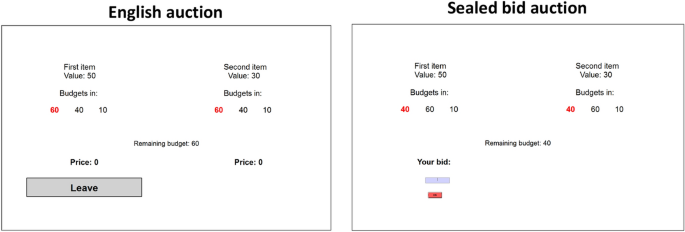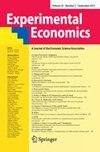Auction design and order of sale with budget-constrained bidders
IF 1.7
3区 经济学
Q2 ECONOMICS
引用次数: 0
Abstract
Abstract The presence of financial constraints changes traditional auction theory predictions. In the case of multiple items, such constraints may affect revenue equivalence and efficiency of different auction formats. We consider a simple complete information setting with three financially constrained bidders and two items that have different values common to all the bidders. Using a laboratory experiment, we find that, as predicted by theory, it is more beneficial for the seller to sell the higher value item first. We then show that the first-price sealed-bid auction yields higher revenue than the English auction, with significant differences in learning of equilibrium strategies.

拍卖设计和销售顺序与预算有限的投标人
摘要资金约束的存在改变了传统拍卖理论的预测。在多物品的情况下,这种约束可能会影响不同拍卖形式的收益等价性和效率。我们考虑一个简单的完整信息设置,其中有三个财务受限的投标人和两个对所有投标人具有不同共同价值的项目。通过实验室实验,我们发现,正如理论预测的那样,卖家优先出售高价值的商品更有利。然后我们表明,第一价格密封拍卖比英式拍卖产生更高的收入,在均衡策略的学习上有显著差异。
本文章由计算机程序翻译,如有差异,请以英文原文为准。
求助全文
约1分钟内获得全文
求助全文
来源期刊

Experimental Economics
ECONOMICS-
CiteScore
4.10
自引率
8.70%
发文量
40
期刊介绍:
Experimental methods are uniquely suited to the study of many phenomena that have been difficult to observe directly in naturally occurring economic contexts. For example, the ability to induce preferences and control information structures makes it possible to isolate the effects of alternate economic structures, policies, and market institutions.Experimental Economics is an international journal that serves the growing group of economists around the world who use experimental methods. The journal invites high-quality papers in any area of experimental research in economics and related fields (i.e. accounting, finance, political science, and the psychology of decision making). State-of-the-art theoretical work and econometric work that is motivated by experimental data is also encouraged. The journal will also consider articles with a primary focus on methodology or replication of controversial findings. We welcome experiments conducted in either the laboratory or in the field. The relevant data can be decisions or non-choice data such as physiological measurements. However, we only consider studies that do not employ deception of participants and in which participants are incentivized. Experimental Economics is structured to promote experimental economics by bringing together innovative research that meets professional standards of experimental method, but without editorial bias towards specific orientations. All papers will be reviewed through the standard, anonymous-referee procedure and all accepted manuscripts will be subject to the approval of two editors. Authors must submit the instructions that participants in their study received at the time of submission of their manuscript. Authors are expected to submit separate data appendices which will be attached to the journal''s web page upon publication. Officially cited as: Exp Econ
 求助内容:
求助内容: 应助结果提醒方式:
应助结果提醒方式:


